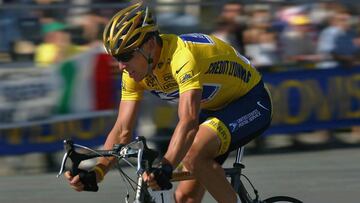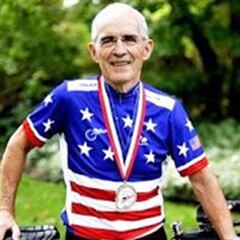Lance Armstrong admits doping for the first time when he was 21
In a new ESPN documentary, Lance Armstrong revealed that his first experience with performance-enhancing drugs goes back to his first professional season.

Lance Armstrong has confessed that he first used performance-enhancing drugs when he was 21 years old. Armstrong, now 48, was stripped of his seven Tour de France titles and handed a lifetime ban in 2012 following a United States Anti-Doping Agency investigation. Having repeatedly denied cheating throughout his career, Armstrong belatedly admitted to using banned substances during an interview with Oprah Winfrey in January 2013.
The legitimacy of the American cyclist's achievements had long been the subject of conjecture after he came back from testicular cancer to dominate cycling's blue ribbon event from 1999 to 2005. However, in the new ESPN documentary LANCE, he confirmed his history with illegal drugs stretched back much further to his maiden campaign as a professional.
Doping was "ingrained in sport" says Armstrong
"In terms of crossing the line, to something that [you would be punished for] if you admitted it or tested positive, then that wouldn't have been until 21 years old," he admitted. "My first professional season. At that time in the sport it was cortisone, or cortisone pre-cursors, or drugs that stimulate your body's own production of cortisone. It was just ingrained in the culture of the sport."
Armstrong is most infamous for his use of EPO and working alongside controversial doctor Michele Ferrari – describing the blood-boosting agent as "a whole other level" and "rocket fuel" compared to the "low-octane doping" of cortisone. In the documentary, he also conceded to using human growth hormone (HGH) throughout 1996 and pondered whether this was a factor in his cancer diagnosis.
The inspiring rise and dramatic fall from grace.@30for30's 'LANCE' is coming May 25th on ESPN Player 📺 pic.twitter.com/iCF7AQmN3o
— ESPN Player (@espnplayer) May 14, 2020
"You know, I don't know the answer to that," he said. "I don't want to say no, because I don't think that's right either. I don't know if it's yes or no, but I certainly wouldn't say no. The only thing I will tell you is, the only time in my life, that I ever did growth hormone, was the 1996 season. And so just in my head, I'm like, growth… growing hormones and cells, like… if anything good needs to be grown, it does. But wouldn't it also make sense that if anything bad, is there, that it too would grow?"
Amstrong comes clean on EPO use
Following his return to professional cycling in 1998, Armstrong insisted he had no concerns over the potential adverse effects of a cancer survivor using EPO. "In many ways - and this is not going to be a popular answer - EPO is a safe drug," he said. "Assuming certain things, assuming [it is] taken properly, taken under the guidance of a medical professional, taken in conservative amounts. There are far worse things you can put in your body."
Related stories
Armstrong believes his considerable fall from grace and resulting absence from the public eye might have actually brought benefits, particularly for his family. "The last five years has really caused me to pause and try to understand, not just myself but what this story meant to other people, what this story meant to the world," he said. "And you know, that's a heavy thing to think about. I never knew the story was as big as it was. I knew it was big, but I didn't know it was that big. If I was competing today, I could tell you who my peers would be. My peers would be Michael Phelps, LeBron James, and so I see where they are… and so only now do I realise, 'that's where you were'. That's where I was. I really don't miss that. And I think, if I'd stayed there, it wouldn't have been good for my family."
LANCE will be available on ESPN Player in the UK, Europe and Africa from 25 May
